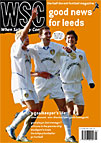 Simon Edwards looks at Lincoln City
Simon Edwards looks at Lincoln City
What were your best and worst moments as a Lincoln fan?
The very worst moments occurred last summer. We genuinely believed we would not have a club. Despite all the hard work of supporters (not just from Lincoln either I might add), the board, club staff and administrator, the executive decision still lay in the hands of a High Court judge. Luckily he was a sympathetic man. Best moment was kicking off this season clear of administration, just glad to be able to go to Kidderminster again.
How are Lincoln as a team perceived by other fans?
A succession of managers have relied on the long ball, with John Beck taking it to extreme lengths. Keith Alexander has the team playing to its strengths, which (as the team largely comprises youngsters from the Unibond League) means no frills football, and again we are castigated for it, though we are no worse than most other Third Division teams. Our strengths include a 6ft 5in centre-half/set piece expert who runs up and down the centre of the pitch for 90 minutes (Ben Futcher), but also the most skilful ball player in the division (Peter Gain).
Does the club have a bigger catchment area that they could tap into if they went up?
Lincoln itself is one of the fastest growing cities in Europe. But the region, though large, is sparsely populated, and now we have Boston in competition with us. Whichever division we play in we need to be in the top three to see any increase in support. Rotherham, incidentally, is our role model.
What difference does having an elected supporter on the board make to the way the club is run?
Theoretically it makes the board more accountable to the fans. However, as the vast majority rarely talk directly to the representatives, getting their input can be like getting blood from a stone. We have an elected supporter as chairman and another on the board, plus the Trust is the largest shareholder, so we do have more control than most clubs.
Milestones & Millstones
1884 The club is formed in a pub on the High Street (one of history’s more long-lasting drunken ideas).
1893 Financial Crisis 1: £300 debt. Money saved by cutting players’ wages.
1894 Club moves to Sincil Bank, where it still resides. Two years later, they reach the FA Cup fifth round for the last time, losing 3-0 to Rangers.
1902 City’s highest ever League placing (fifth in the Second Division).
1923-24 Financial Crisis 2: £3,000 debt. The supporters raise funds.
1950s Under Bill Anderson, City enjoy their longest spell in the old Division Two.
1963-64 Financial Crisis 3: £10,000 debt. Businessman Frank Eccleshare assumes control and saves the club.
1976 Under Graham Taylor City win the Fourth Division with a record number of points and 111 goals.
1980-83 Colin Murphy leads City to promotion with only 25 goals conceded. But financial problems intervene. The ground is sold to the local authority.
1985 Lincoln visit Valley Parade on the day of the fire; they lose two supporters.
1987 Lincoln are the first club relegated to the Conference after slipping to the bottom 15 minutes after kicking their last ball of the season. Colin Murphy returns and guides them back up.
2002 Lincoln almost go under. The ground is bought back from the council for collateral and the Lincoln City Supporters Trust is established. 2002-03 begins with a three-month spell in administration.
Fondly remembered
Gareth Ainsworth ~ One of our most recent heroes. He was at the club for less than two years, and scored 37 goals in 83 appearances. Though he was an exciting and successful player, his attitude was what elevated
Best forgotten
Sam Ellis ~ Achieved the unique feat of turning from a hero as captain of the 1976 promotion side to pantomime villain during his time in management. Replacing Keith Alexander for one ineptseason in charge, he brought in over-paid, over the hill buddies as play.
From WSC 195 May 2003. What was happening this month